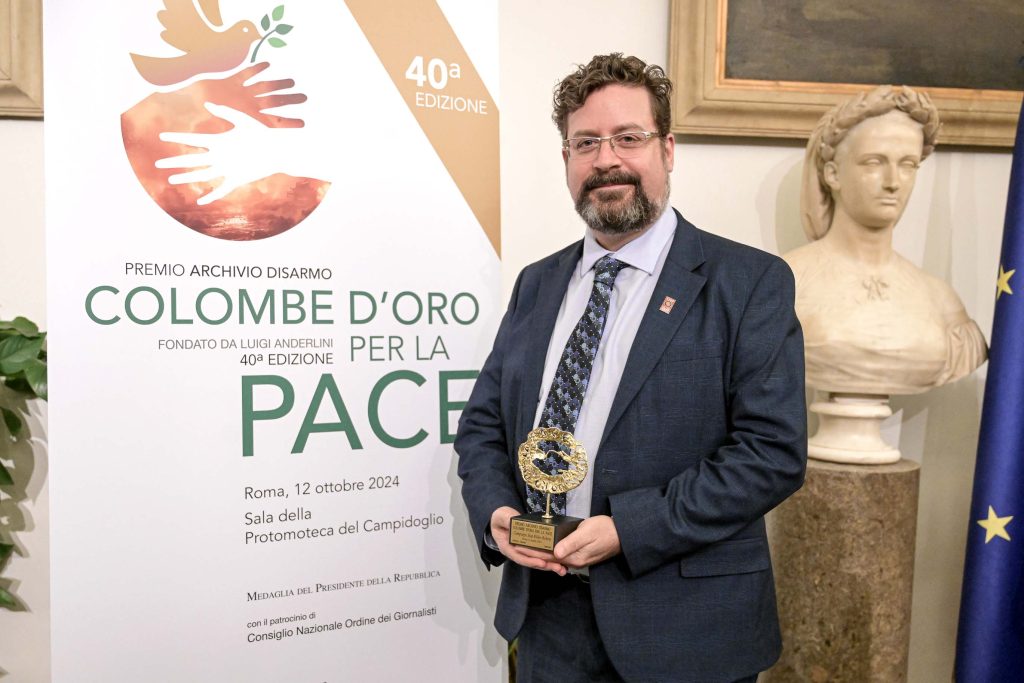
SPE Professor Peter Asaro Accepts the Golden Dove for Peace Prize on Behalf of the Stop Killer Robots Campaign
“As it becomes increasingly clear that artificial intelligence and automated decision making will play a key role in the way we live as individuals, as societies, and as a global community, it is crucial to establish rules for how this applies to the use of violent force,” said Peter Asaro, associate professor of media studies, in his speech at the Golden Dove for Peace Prize ceremony. The Golden Dove is awarded annually to an international figure or organization that has made a significant contribution to the cause of peace. Asaro was at the ceremony, organized by Archivio Disarmo with the support of Legacoop, to accept the award on behalf of the Stop Killer Robots campaign. Stop Killer Robots is a global coalition that works to ensure that there is human control of the use of force and calls for the creation of international law to regulate autonomy in weapons systems.
Asaro’s research focuses on the social, cultural, political, legal, and ethical dimensions of military robotics and UAV drones, using an interdisciplinary lens that combines media theory with science and technology studies. He is a founder and the vice chair of the International Committee for Robot Arms Control (ICRAC), where he works on human rights issues surrounding targeted killing by drones and arms control for autonomous lethal robotics. ICRAC is one of the eight founding member organizations of the Stop Killer Robots campaign, of which Asaro currently serves as the vice chair of the steering committee. This campaign, founded in 2012, is a global coalition of more than 250 international, regional, and national NGOs and academic partners working in 70 countries to promote the creation of international law to guarantee human control over the use of force.
“The use of algorithms in lethal decision making may also be used to obscure accountability and conceal responsibility for war crimes and atrocities committed against civilians in conflicts,” said Asaro. “Accepting AI-enabled dehumanization, through the targeting and killing of people in military contexts, is untenable and will have significant consequences in policing, border control, and wider society. These technologies also pose serious threats to global peace and stability, promising low-risk warfare and threatening new arms races. It is imperative that regulation catch up to the pace of technological development and reflect universally accepted norms of human rights and human dignity.”
The use of artificial intelligence in military operations has steadily increased over the years. The campaign points to the increase in the number of reports on the use of military AI and weapons with autonomous capabilities in ongoing conflicts. A recent report from Reuters noted China’s use of Meta’s open-source AI model to develop its own tools with potential military uses. And earlier this month, Meta announced it would allow U.S. national security agencies and defense contractors to use Llama, one of its open-source artificial intelligence models, for “national security applications”—although under Meta’s acceptable use policy, the latest Llama 3 model is not to be used for “military, warfare, nuclear industries or applications, espionage.”
“In this time of global crisis and conflict, it is more necessary than ever that countries work together to find common ground and agreement and reaffirm faith in international cooperation and respect for international norms and laws,” said Asaro. “We also hope that such a treaty on autonomous weapons could be a model for the global governance of artificial intelligence beyond its use in weapons and the military. The risks to humanity if we fail to reach such agreement and adopt a legally binding treaty are too great to let our fears and distrust continue to stall the process.”
